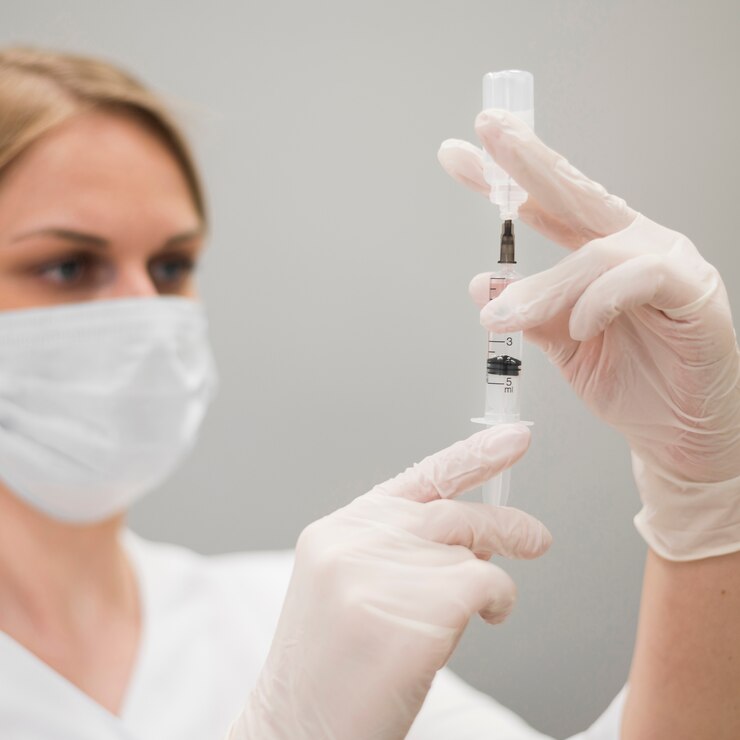Microsuction Ear Wax Removal: A Safe and Pain-Free Solution In today’s fast-paced world, ensuring your hearing health is more important than ever, whether you’re a frequent traveller or a dedicated healthcare professional. At Ash Pharmacy, we understand how crucial it is to maintain optimal ear health, and that’s why our microsuction ear wax removal service is at the forefront of modern ear care. This article delves into the nuances of microsuction, explaining why it’s considered a safe and pain-free solution compared to traditional methods. Understanding Ear Wax and Its Importance Ear wax, medically referred to as cerumen, plays a vital role in protecting our ears from dust, bacteria, and other foreign particles. It also provides a natural lubricant to help keep the skin inside the ear canal healthy. However, when excess wax accumulates, it can lead to discomfort, hearing issues, and other complications. Travellers, in particular, might experience a build-up of ear wax due to frequent changes in altitude and environmental conditions. Similarly, healthcare professionals might encounter high levels of ear wax in their patients, emphasising the need for an effective and gentle treatment method. What Is Microsuction Ear Wax Removal? Microsuction ear wax removal is a modern, non-invasive procedure used to clear the ear canal of excess wax. Unlike traditional methods such as ear syringing or manual extraction with curettes, microsuction utilises a specialised suction device combined with a microscope for enhanced precision and safety. This method is designed to remove ear wax quickly while minimising discomfort, making it an ideal option for individuals who might be sensitive or have had adverse experiences with other methods. The Microsuction Procedure: Step-by-Step Overview Preparation and Examination Before any treatment begins, a thorough examination of the ear is conducted by a trained professional. Using a microscope, the practitioner visualises the ear canal and assesses the extent and nature of the wax build-up. This careful evaluation is instrumental in determining whether microsuction is the most appropriate treatment method. The Suction Process Once the examination is complete, the microsuction procedure can start. The practitioner uses a micro-suction device, which creates a gentle vacuum effect, to remove the wax from the ear canal. The process is monitored closely through a microscope, ensuring that only the unwanted wax is extracted while the delicate tissues of the ear remain unharmed. Often, patients describe the sensation as slightly unusual rather than painful, which is a significant improvement over more invasive techniques. Post-Procedure Care After the procedure, patients may experience a brief period of mild ear sensitivity. However, any discomfort typically subsides quickly. The practitioner might offer guidance on how to care for the ear during the recovery period, as well as tips for preventing excessive wax build-up in the future. Benefits of Microsuction Ear Wax Removal Microsuction offers several advantages over traditional ear wax removal methods, making it a preferred choice for both patients and healthcare professionals. Precision and Safety The utilisation of a microscope during the procedure allows for a clear and magnified view of the ear canal. This results in a very controlled extraction process, significantly reducing the risk of damage to the ear drum or other sensitive structures within the ear. Comfort and Pain-Free Experience Patients appreciate that microsuction is generally a painless procedure. The absence of cold water injections or invasive instruments means that the patient’s comfort is prioritised throughout the treatment. This is particularly beneficial for those with sensitive ears or a history of painful ear syringing procedures. Efficiency and Quick Recovery The entire procedure is typically completed within 20 to 30 minutes, making it ideal for busy individuals. Travellers can benefit from the rapid appointment times, ensuring that ear discomfort does not interfere with travel plans. Likewise, healthcare professionals can confidently refer patients to a swift and effective treatment, knowing that recovery times are minimal. Who Can Benefit from Microsuction? One of the most attractive aspects of microsuction ear wax removal is its suitability for a wide range of individuals. It is an excellent option for: People experiencing hearing impairment or discomfort due to wax blockages Individuals who have not responded well to previous ear wax removal methods Patients with narrow ear canals where traditional methods are less effective or safe Frequent travellers who may develop excess ear wax as a result of environmental changes Healthcare professionals seeking a reliable procedure to recommend in patient care The inclusivity and safety profile of this technique make it a sought-after service at Ash Pharmacy. Comparing Microsuction to Traditional Methods Traditional methods, such as ear syringing and manual extraction using curettes, have been widely used for decades. However, they come with inherent risks, especially in patients with sensitive ear canals or pre-existing ear conditions. Ear syringing may sometimes lead to complications such as infections, ear drum perforation, or increase in wax impaction if not followed by proper drying techniques. In contrast, microsuction minimises these risks by offering a controlled and direct method of extraction. The use of modern equipment and a visual approach ensures that the procedure is both efficient and safe, which is why it is increasingly being recommended over older techniques. Ensuring a Quality Experience at Ash Pharmacy At Ash Pharmacy, in addition to safeguarding your health, we also prioritise a smooth, comfortable, and professional experience. Our practitioners are experienced in performing microsuction, ensuring that each patient receives personalised care tailored to their specific needs. Whether you are a traveller needing prompt relief or a healthcare professional looking for a dependable solution for your patients, our doors are open for you. We encourage you to stay informed about your ear health and to take a proactive approach in managing any issues related to wax build-up before they escalate into more serious problems. Regular check-ups can help you avoid complications that might interfere with your quality of life and daily routine. Remember, early intervention is key. Your Next Step Toward Better Ear Health If concerns about ear wax build-up are affecting your quality of life or if you have experienced discomfort during previous
Weight Loss Injections: A Science-Backed Guide to How They Work
Weight Loss Injections: A Science-Backed Guide to How They Work Weight loss injections have emerged as an innovative option for individuals seeking support in their journey towards a healthier lifestyle. As a science‑backed method, these injections are gaining traction among both travellers looking for convenient health solutions and healthcare professionals keen to offer their patients evidence‑based options. This article delves into the mechanism behind weight loss injections, the science that underpins their efficacy, and the safety measures that ensure they are a viable complement to a well‑balanced approach to weight loss. The Science Behind Weight Loss Injections Weight loss injections typically involve the administration of compounds designed to influence metabolism, regulate appetite, and improve insulin sensitivity. These compounds, which include peptides, hormones, or vitamins, are developed through rigorous scientific research and clinical trials. Their ability to stimulate the body’s natural processes means they can help manage weight when combined with lifestyle changes. Pharmaceutical research has broadly demonstrated that when administered properly, these injections can modulate various biological pathways. They act to enhance the breakdown of fats and improve the body’s efficiency in utilising energy. By targeting the endocrine system directly, weight loss injections offer a more precise intervention compared to some oral medications. The science behind these treatments is continually evolving as new data becomes available, ensuring that the most current and effective therapies are brought to the forefront. How Weight Loss Injections Work Mechanism of Action The core mechanism of weight loss injections lies in their interaction with the body’s hormonal pathways. In many cases, the injections include compounds that mimic or stimulate hormones responsible for satiety and energy regulation. For example, certain injections may increase the production of hormones such as glucagon-like peptide-1 (GLP-1), which plays a crucial role in signalling fullness and reducing food intake. By enhancing the body’s metabolic response, these treatments may support a reduction in overall calorie consumption while simultaneously encouraging fat metabolism. The Role of Insulin Sensitivity and Metabolism Improved insulin sensitivity is another important factor in the effectiveness of weight loss injections. Enhancing the body’s response to insulin helps regulate blood sugar levels more effectively, thereby reducing fat storage and aiding in the breakdown of triglycerides. This process not only supports weight loss but can also contribute to better overall metabolic health, an important factor for those with pre‑existing conditions such as type 2 diabetes. Moreover, the injections are carefully dosed to gently prompt the body’s natural weight regulation mechanisms. They are most effective when used as part of a comprehensive treatment plan that includes dietary adjustments, exercise, and lifestyle modifications. It is this synergy of science and personal commitment that underpins the long‑term success of weight management strategies. Potential Benefits of Weight Loss Injections One of the primary advantages of weight loss injections is the targeted approach they offer. By working at a hormonal level, these injections can help reduce appetite, improve energy expenditure, and enable more effective fat metabolism. For those who have struggled with traditional dieting methods, the injections can act as a catalyst for change, contributing to improved weight management outcomes. Many healthcare professionals advocate for such treatments—especially in cases where patients have not seen comprehensive benefits from lifestyle changes alone. For travellers who may find it challenging to stick to routine dietary habits, these injections offer an accessible option to maintain their weight management goals while on the move. The ease of administration and the precise, science‑backed formulation make them an attractive option for many looking to achieve and sustain a healthy weight. Safety, Side Effects, and Considerations As with any medical treatment, the safety profile of weight loss injections is of paramount importance. In most cases, these treatments are well‑tolerated, with mild side effects that tend to resolve quickly. Commonly reported effects include minor discomfort at the injection site or slight gastrointestinal changes during the adjustment period. However, extensive clinical trials and ongoing monitoring continue to affirm the overall safety of these treatments when administered under professional guidance. It is crucial to remember that weight loss injections are best utilised as a supplementary tool, rather than a sole solution. An individual’s unique health profile, including any pre‑existing conditions, must be carefully considered before commencing treatment. Healthcare professionals play a significant role in evaluating the suitability of these injections for each patient. Their expertise ensures that dosage and treatment duration are appropriately adjusted to meet individual needs, reducing the risk of adverse reactions and maximising therapeutic benefits. Integrating Weight Loss Injections into a Comprehensive Health Strategy Weight loss injections should ideally serve as part of an integrated programme aimed at achieving overall health improvements. They are designed to complement key lifestyle modifications such as a balanced diet and regular physical activity. For instance, incorporating nutritional guidance and exercise plans can significantly amplify the benefits of the injections. Many patients report that these combined efforts not only enhance weight loss outcomes but also improve overall wellbeing. The scientific approach underpinning these injections encourages a holistic view of health. Rather than simply focusing on reducing weight, the emphasis is on optimising metabolic health, building sustainable dietary habits, and improving physical fitness. Healthcare professionals often stress that the injections can offer an extra boost for those who have long battled with weight issues despite their best efforts. This integration of medical treatment with personal lifestyle changes makes for a robust and effective long‑term strategy. Who Can Benefit from Weight Loss Injections? Weight loss injections may be suitable for a wide range of individuals, particularly those who have found traditional weight loss methods challenging to maintain. They are especially valuable for patients dealing with metabolic conditions, such as insulin resistance, where a controlled intervention can lead to improved outcomes. Travellers, whose lifestyle often involves unpredictable meal schedules and varying activity levels, may also benefit from these injections as they offer a systematic approach to weight management despite an often hectic routine. It is recommended that anyone considering weight loss injections undergoes a thorough medical consultation. This ensures that the chosen
Rabies Vaccination for Travelers: When, Why, and How to Prepare
Traveling to new destinations opens up a world of experiences—and challenges, too. One such challenge is the risk of contracting rabies, a life‐threatening viral disease transmitted mostly by animal bites. In this article, we explore the essentials of rabies vaccination for travellers, discussing when to get vaccinated, why it is crucial, and how to prepare. Designed for both inquisitive travellers and healthcare professionals, this comprehensive guide provides the clarity and detail needed to navigate travel health decisions confidently. Understanding Rabies and Its Global Impact Rabies is a viral infection that affects the central nervous system, ultimately leading to fatal neurological complications if left untreated. The virus is predominantly spread through the saliva of infected animals, most notably dogs. Although rabies is rare in many developed countries due to strict animal control measures and widespread vaccination programmes, it remains a significant public health concern in many parts of Asia, Africa, and Latin America. For travellers venturing into high‐risk regions, understanding the epidemiology of rabies is essential. This awareness not only prompts informed decision‐making regarding vaccination but also underscores the importance of basic precautions, such as steering clear of stray animals and seeking immediate medical attention if bitten. Why Rabies Vaccination is Essential for Travellers While not every travel plan includes exposure to rabies, the unpredictable nature of travel means that encounters with stray animals can happen. The rabies vaccine is a pre-exposure prophylactic measure designed to create immunity before coming into contact with the virus. For those travelling to regions where rabies is endemic, vaccination stands as a critical line of defence. Risk Assessment for Travellers Not all travellers face the same risk level when it comes to rabies. Individuals planning adventures that might include rural visits, trekking in remote areas, or extended stays in endemic regions should particularly consider vaccination. Healthcare professionals recommend that anyone planning such journeys consult with a travel health specialist to assess personal risk levels. The decision to undergo pre-exposure vaccination should be informed by the destination’s rabies status, the duration of stay, and the type of activities planned during the trip. The Role of Pre-Exposure Prophylaxis Pre-exposure prophylaxis involves administering a series of rabies vaccinations prior to travel. This approach is especially advantageous because it simplifies the treatment regimen in the event of exposure; individuals who have been pre-vaccinated typically require fewer vaccine doses and no rabies immunoglobulin should an exposure occur. By reducing both the complexity and urgency of post-exposure treatment, pre-exposure vaccination offers travellers peace of mind and enhanced safety. When and How to Prepare for the Vaccination The timing of the rabies vaccination is a crucial factor influencing its effectiveness. Health experts advise that travellers receive the vaccination well in advance of departure—ideally, at least one month before traveling. This timeframe allows the body to develop a robust immune response, ensuring maximum protection during the trip. Consulting with Healthcare Professionals A vital part of the preparation process is consulting with a healthcare professional who specialises in travel medicine. This consultation provides an opportunity to discuss travel itineraries, personal health status, and any pre-existing medical conditions that could affect the vaccination schedule. Such tailored advice ensures that the pre-exposure regimen is optimally aligned with the traveller’s needs. Understanding the Vaccination Process The rabies vaccination process typically involves a series of three injections given over the course of several weeks. During the first visit, the initial dose is administered, followed by subsequent doses on days 7 and 21 or 28. This schedule is designed to induce a lasting immune response and equip the body to fight off the rabies virus effectively. It is important to note that in the unlikely event of an emergency, post-exposure prophylaxis (PEP) remains an option. However, PEP is more complex and time-sensitive, reaffirming the notion that pre-exposure vaccination is the most reliable and straightforward method of protection when travelling to high-risk areas. Considerations for Healthcare Professionals Healthcare professionals play a critical role in public health, especially in the domain of travel medicine. When advising patients on travel vaccinations, professionals must communicate both the benefits and limitations of rabies vaccination with clarity and precision. They should emphasise that while the vaccine offers significant protection, it is not a substitute for practical safety measures during travel, such as avoiding contact with stray animals and adhering to local health guidelines. Moreover, professionals should be aware of updates in travel health protocols and vaccination recommendations from recognised institutions such as the World Health Organization and Public Health England. Staying informed enables them to provide evidence-based advice that considers the latest research and regional health data. Integrating Rabies Vaccination into Your Travel Health Strategy Preparation is key when it comes to travel health. Rabies vaccination should be viewed as an integral component of a broader travel health strategy that includes other vaccinations, medication for travellers’ diarrhoea, and comprehensive travel safety measures. By planning ahead and incorporating preventive healthcare practices, travellers can significantly mitigate the risks associated with international travel. Travel health is a personalised journey. For some, scheduling a routine check-up to discuss vaccination options might be all that is needed to start a safe and enjoyable travel experience. Others, particularly those venturing into remote or high-risk areas, may benefit from a more thorough consultation. By engaging in these discussions, travellers empower themselves with the knowledge required to make informed decisions about their health. Final Considerations and How to Proceed with Confidence Rabies remains a grave concern in many parts of the world, and the thought of exposure can add unnecessary stress to the excitement of travelling. However, with proper planning and awareness, the risks associated with rabies can be effectively managed. Travellers who take proactive steps—such as obtaining the rabies vaccination in advance and consulting with knowledgeable healthcare professionals—will be better prepared to deal with any unexpected challenges. At Ash Pharmacy, we understand the importance of safeguarding your health as you explore new horizons. Our team is here to help you navigate the complexities of travel vaccination with ease and confidence. If
5 Adult Vaccines You Might Be Missing (And Why They Matter)
5 Adult Vaccines You Might Be Missing (And Why They Matter) In today’s fast‑paced world, staying on top of your health as an adult is more important than ever. While childhood vaccinations often take centre‑stage, many adults may be unknowingly missing key immunisations that protect them from serious diseases. Whether you’re a globetrotter or a healthcare professional, understanding these vaccines and their benefits can be a real game‑changer. In this article, we explore five essential adult vaccines, explain why they matter, and provide practical insights into how they can safeguard your health. Introduction Vaccinations aren’t just for children. In fact, as adults, our immunity can wane and our lifestyles can expose us to various pathogens. Travellers, in particular, face unique exposure risks when visiting different parts of the world, while healthcare professionals work in environments where infectious diseases can spread rapidly. Adults who have not updated their vaccinations may be at risk of complications that are entirely preventable. This article focusses on five adult vaccines that might have been overlooked, offering detailed information for both patients and professionals. 1. Influenza Vaccine The seasonal flu is one of the most common illnesses that affect adults every year. While many adults receive the annual flu shot, some still postpone or overlook this essential vaccine. The influenza vaccine is critical for reducing the risk of severe illness, hospitalisation, and even death, particularly among older individuals or those with underlying health conditions. For travellers, especially those visiting countries with different flu strains or during peak seasons, getting a flu shot before departure can help prevent disruption during your trip. Healthcare professionals know that a flu outbreak can quickly compromise patient safety in clinical settings, making the annual influenza vaccine a cornerstone of preventative health measures. 2. Tetanus, Diphtheria, and Pertussis (Tdap) Vaccine Many adults believe that the tetanus vaccine they received as a child provides lifelong protection. However, immunity diminishes over time. The Tdap booster not only safeguards against tetanus but also protects against diphtheria and pertussis – a highly contagious respiratory infection known as whooping cough. This vaccine is particularly important for those in close contact with vulnerable populations such as infants, the elderly, or immunocompromised patients. Travellers, especially those engaging in adventurous activities or exploring rural areas, might expose themselves to wounds or cuts that can become contaminated with tetanus spores. A timely booster could be an essential preventative step. 3. Shingles Vaccine Shingles, caused by the reactivation of the chickenpox virus, can lead to excruciating pain and long‑term complications known as postherpetic neuralgia. Adults over 50 are particularly at risk. Although not everyone who has had chickenpox will develop shingles, the risk increases with age and can disrupt quality of life significantly. For healthcare professionals, managing the discomfort and complications associated with shingles is a real challenge, highlighting the importance of prevention. For travellers, especially older adults embarking on long journeys or stressful trips, the shingles vaccine is a wise investment. Its capacity to reduce the incidence and severity of outbreaks makes it a vaccine that should not be overlooked. 4. Hepatitis A Vaccine Hepatitis A is a viral liver disease that transmits through contaminated food and water. Many adults may assume that modern sanitation practices or vaccinations in childhood offer adequate protection, but the reality is different. Travellers heading to countries with varying levels of food and water hygiene are particularly vulnerable to this virus. This vaccine is straightforward yet incredibly effective. By incorporating the Hepatitis A vaccine into your travel preparations, you can significantly reduce your risk of contracting the disease. Healthcare professionals working in global health or travel medicine will often recommend it as a key part of the travel vaccination regimen. Its role in preventing liver complications adds another layer of importance, ensuring you continue to stay active and healthy, whether at home or abroad. 5. Pneumococcal Vaccine The pneumococcal vaccine protects against pneumococcal diseases, which can lead to severe infections such as pneumonia, meningitis, and blood infections. Adults—specifically those over 65 or with underlying health issues—should consider this vaccine essential. Even younger adults with certain risk factors can benefit significantly from its protection. For those travelling internationally, particularly to regions where healthcare facilities may be less accessible, staying vaccinated against pneumococcal infections is a prudent move. Healthcare professionals recognise that preventing such infections reduces the burden on healthcare systems and improves patient outcomes markedly. Regular reviews and timely boosters, in line with national guidelines, are key to maintaining long‑term immunity. Why These Vaccines Matter The importance of adult vaccinations extends well beyond the prevention of individual disease outbreaks. Every vaccine not only protects the individual but also contributes to herd immunity, reducing the overall prevalence of disease in the community. For healthcare professionals, ensuring that adults are up‑to‑date with these immunisations means fewer cases of preventable diseases and a safer environment for vulnerable patients. Travellers benefit from these vaccines by minimising the risk of contracting diseases that could disrupt their journeys or lead to severe complications abroad. With global travel resuming at a robust pace, a comprehensive vaccination plan is more crucial than ever. It’s about safeguarding your health, protecting others, and maintaining your lifestyle without interruption. Take Control of Your Health Today Staying on top of your vaccinations can sometimes feel like a daunting task, especially with busy work schedules or travel itineraries. However, recognising the role of these key immunisations can offer peace of mind and lasting protection. Whether you’re planning your next adventure or looking after your patients, these five vaccines form a critical part of your health armoury. If you’re unsure about your vaccination status or need professional advice on which immunisations are right for you, consider reaching out. At Ash Pharmacy, we provide private services designed to meet the needs of both travellers and healthcare professionals. Book an appointment with us today and take the next step towards a healthier, safer future.
5 Skincare Habits Everyone Should Adopt for Healthier Skin
5 Skincare Habits Everyone Should Adopt for Healthier Skin Healthy skin begins with mindful daily practices that not only enhance your appearance but also contribute to your overall wellbeing. Whether you are a frequent traveller or a healthcare professional managing a hectic schedule, incorporating just a few key skincare habits into your routine can make a significant difference. In this article, we explore five essential skincare habits that can help you maintain healthy, radiant skin no matter where life takes you. 1. Cleanse Gently and Thoroughly A healthy skincare routine starts with proper cleansing. Throughout the day, skin accumulates pollutants, excess oil, and impurities that could lead to breakouts or premature ageing if not removed. For travellers who might be exposed to different environmental challenges and for busy professionals, a gentle yet effective cleanser is key. Use lukewarm water and a mild cleanser formulated for your skin type to wash your face twice daily. Keep in mind that over-cleansing can strip your skin of natural oils, so choose products that maintain your skin’s natural moisture balance. For those who frequently change time zones or environments, it might be helpful to invest in travel-sized, dermatologist-recommended cleansers. This small adaptation could go a long way in ensuring your skin remains calm and resilient regardless of your travels. 2. Keep Your Skin Hydrated with Daily Moisturising Hydration is the lifeblood of healthy skin. Daily moisturising not only keeps your skin supple but also serves as a barrier against external stress factors such as pollution and wind. Choose a moisturiser that suits your skin type; for those with oily or combination skin, a lightweight, non-comedogenic product works best, while richer creams may be ideal for dry or mature skin. When you are on the road or in the midst of a busy schedule, carrying a small, travel-friendly bottle of moisturiser can be a lifesaver. Regular use helps to lock in moisture, reduce inflammation, and promote a more youthful appearance. As with cleansing, ensure that your moisturiser is free from harsh chemicals that might irritate sensitive skin. 3. Protect Your Skin with Sunscreen One of the most crucial aspects of any skincare routine is protecting your skin from the sun’s harmful ultraviolet (UV) rays. Regardless of whether you are under clear blue skies or overcast conditions, a broad-spectrum sunscreen is essential. UV protection not only helps prevent premature ageing and pigmentation issues but also reduces the risk of skin cancer. Travel often means exposure to unexpected levels of sunlight, so reapply sunscreen every two hours when outdoors, and use products with at least SPF 30. It is important to choose a sunscreen that is suitable for your skin type—whether that means a matte finish for oily skin or a hydrating formula for dry skin. Protecting your skin should not be viewed as a one-size-fits-all effort, so consider seeking advice from a skincare professional to identify the best product for your needs. 4. Maintain a Nutrient-Rich Diet and Hydration What you feed your body directly influences the health of your skin. A balanced diet rich in antioxidants, vitamins, and minerals can help combat the effects of environmental stressors and promote faster cell regeneration. Incorporate a variety of fruits, vegetables, lean proteins, and healthy fats such as those from nuts and oily fish into your meals. Foods high in vitamin C and E are particularly beneficial as they help protect your skin cells from damage. In addition to a nutrient-dense diet, regular hydration is vital. Drinking plenty of water throughout the day helps to maintain your skin’s elasticity and facilitates the natural detoxification process. For healthcare professionals and travellers alike, balancing diet amidst a busy schedule can be challenging. However, small practices like carrying a refillable water bottle throughout the day can greatly enhance your skin’s longevity and vigour. 5. Regular Skin Monitoring and Professional Check-Ups Regular skin inspections are essential, particularly for those at higher risk due to lifestyle or environmental exposures. Keeping a close watch on any changes or irregularities can lead to early detection of potential skin issues. Whether it is checking for unusual moles, changes in texture, or persistent irritation, an informed approach to skin health can make all the difference. For travellers and professionals on the go, it might seem difficult to prioritise routine check-ups, but modern technology offers many convenient solutions. Periodically scheduling a consultation with a skincare specialist or dermatologist can provide you with customised advice tailored to your skin’s needs. If you’re looking for professional guidance and a personalised approach to your skincare regimen, consider booking an appointment here at Ash Pharmacy. Beyond the traditional beauty notion, regular professional evaluations can help adjust your skincare routine appropriately if your environment or lifestyle changes. This proactive approach ensures that you are not just reacting to skin problems but actively preventing them through expert advice and tailored treatments. Conclusion: Small Changes for Significant Impact Adopting these five skincare habits can set the foundation for healthier, vibrant skin regardless of your busy schedule or globetrotting adventures. By cleansing thoroughly, keeping your skin well-hydrated, protecting it from UV damage, maintaining a nutrient-rich diet, and staying vigilant through regular professional check-ups, you put yourself in control of your skin’s long-term health. Each habit, when combined, forms a comprehensive approach that embraces both preventive and proactive skin care measures. Whether encountering the rigours of travel, the pressures of a high-paced career, or simply the daily demands of life, these strategies ensure your skin continues to look and feel its best. If you’re ready to elevate your skincare routine with expert guidance, why not schedule a consultation? Our experienced team at Ash Pharmacy is here to help you tailor a personalised plan that meets your individual needs. Book an appointment easily via our website by visiting Ash Pharmacy Book Now and discover a journey towards healthier skin built on trusted, professional care.
10 Tips to Stay Motivated During Your Weight Loss Journey
10 Tips to Stay Motivated During Your Weight Loss Journey Embarking on a weight loss journey can feel both exciting and daunting, whether you’re a busy traveller or a dedicated healthcare professional balancing various responsibilities. Staying motivated is crucial to achieving long-term success, and with the right mindset and actionable strategies, you can overcome obstacles and reach your goals. In this article, we explore 10 practical tips to help you maintain your motivation and keep that positive momentum alive throughout your weight loss journey. 1. Set Realistic Goals One of the most important steps in staying motivated is setting achievable goals. Instead of aiming for drastic changes overnight, break your weight loss plan into small, manageable steps. By celebrating each milestone, you maintain a sense of accomplishment which fuels further progress. Whether you’re a frequent traveller or a healthcare professional managing your career and personal life, setting realistic goals helps you stay committed without feeling overwhelmed. 2. Create a Structured Plan A clear, structured plan provides direction and instils confidence. Develop a routine that includes time for exercise, healthy meals, and adequate rest. It might be helpful to create a weekly schedule or a digital calendar to track your meals and workouts. Consistency is key, and having a plan can help integrate healthy habits into your daily routine, even when your schedule gets hectic. This is particularly useful for those on the go, ensuring that no matter where you are, your plan remains intact. 3. Embrace Variety in Your Workouts Keeping your exercise routine diverse can greatly contribute to staying motivated. Instead of sticking to one monotonous workout, mix it up with activities like brisk walking, cycling, yoga, and strength training. This not only prevents boredom but also challenges your body in new ways. For travellers, look for local fitness classes or explore scenic outdoor activities to blend exercise with adventure, making your fitness journey an integral part of your travel experience. 4. Maintain a Balanced Diet Nutrition plays a pivotal role in weight loss and overall well-being. Focus on eating a balanced diet rich in whole foods, lean proteins, fruits, vegetables, and whole grains. Avoid crash diets that promise rapid results but can lead to nutritional deficiencies. A well-planned diet fuels both your body and mind, providing the energy you need to stay active and motivated on your weight loss journey, whether at home or abroad. 5. Keep a Progress Journal Documenting your progress can be an encouraging way to track your achievements and setbacks. Record your workouts, meals, weight changes, and feelings throughout your journey. Over time, you’ll be able to see the tangible progress you’ve made and identify patterns that may need adjustment. This reflective practice is particularly beneficial for healthcare professionals who appreciate data-driven feedback as well as travellers who want to look back on their transformative experiences. 6. Find a Support Network Having a circle of supportive family, friends, or fellow weight loss enthusiasts can make a significant difference in your motivation. Sharing your challenges and victories with someone who understands your goals can offer both accountability and encouragement. Whether through online forums, local workout groups, or community events, the shared experience of personal improvement can be incredibly uplifting. A supportive network can also provide valuable tips and remind you that you’re not alone on this journey. 7. Reward Yourself for Milestones Incorporating rewards into your weight loss plan is an effective way to stay motivated. When you reach a milestone, treat yourself to something special that isn’t food-related—a massage, a new workout outfit, or even a small getaway. These rewards serve as positive reinforcements that celebrate your hard work. For travellers, this might mean exploring a new part of the city or indulging in a well-deserved break to relax and recharge. 8. Stay Positive and Practice Self-Compassion Weight loss journeys are rarely linear and often come with ups and downs. It’s important to maintain a positive mindset and practice self-compassion, understanding that every setback is a learning opportunity rather than a failure. Replace negative self-talk with affirmations, and remind yourself of the reasons you embarked on this journey. This mental shift can help you overcome challenges with resilience and maintain a steady course towards your goals. 9. Leverage Technology and Apps In today’s digital era, numerous apps and online resources are available to support your weight loss efforts. From fitness trackers to meal planning apps, technology can help you monitor your progress, set reminders, and even connect with like-minded individuals. By utilising these tools, you can stay organised and motivated, no matter where your travels take you. Technology can transform your approach, making it easier to integrate healthy habits into a busy lifestyle. 10. Seek Professional Guidance Sometimes, professional advice can provide the additional boost needed to keep you on track. Whether it’s from a nutritionist, a personal trainer, or a healthcare professional, getting tailored guidance can help refine your approach and address any underlying challenges. At Ash Pharmacy, we offer private services aimed at supporting your overall well-being, ensuring that you receive personalised care throughout your health journey. If you’re ready to take your commitment to the next level, consider booking an appointment with our experienced team for further support and expert advice. Incorporating these 10 tips into your weight loss journey can help you navigate challenges with a clear strategy and a motivated mindset. Remember, whether you travel frequently or work in a demanding healthcare environment, your commitment to a healthier lifestyle can be maintained with the right tools and support. Each step you take not only brings you closer to your weight loss goals but also enhances your overall quality of life. Embrace the journey, celebrate the small victories, and keep moving forward with confidence. By integrating realistic goal setting, diverse activities, and professional support tailored to your unique needs, you can sustain your motivation and achieve lasting results. We invite you to explore more about how we can assist you on your health and wellness journey. Visit our website
Top 5 Travel Vaccines You Might Need for Your Next Trip
Top 5 Travel Vaccines You Might Need for Your Next Trip Embarking on a new adventure means not only soaking up new cultures and experiences but also ensuring that your health is protected along the way. Whether you’re venturing to remote corners of the globe or visiting bustling urban centres, being proactive about your health can provide peace of mind and keep your travel plans on track. In this post, we highlight the top five travel vaccines you might need before jetting off, along with detailed insights tailored for both travellers and healthcare professionals. 1. Hepatitis A Vaccine Hepatitis A is a viral liver infection that is commonly transmitted through contaminated food and water. Travellers visiting areas where sanitation standards are lower, or where the risk of contamination is high, should consider taking the Hepatitis A vaccine. This vaccine is particularly recommended for those heading to parts of Asia, Africa, and Latin America. The immunity conferred by the Hepatitis A vaccine can last for many years after a complete course, making it an essential preventive measure. From a healthcare perspective, understanding the vaccine’s efficacy and administration guidelines is crucial. For travellers, it’s advisable to schedule your vaccination well in advance of your trip, as it typically takes a couple of weeks for the vaccine to become fully effective. This proactive approach ensures that you have sufficient immunity to enjoy your travels worry-free. 2. Typhoid Vaccine Typhoid fever is another serious bacterial infection that can be contracted through contaminated water or food, particularly in regions with less reliable water purification practices. The Typhoid vaccine is highly recommended for travellers planning to visit developing countries or areas where epidemic outbreaks are more common. For healthcare professionals, it is important to evaluate the traveller’s itinerary and discuss the specific risks associated with typhoid-endemic regions. Depending on the type of vaccine (oral or injectable), the vaccination schedule might vary, so preparing ahead is key. By opting for the Typhoid vaccine, travellers can significantly reduce their risk of contracting the disease, thereby ensuring that their trip remains a positive experience. 3. Yellow Fever Vaccine Yellow fever is a serious viral disease, transmitted primarily by infected mosquitoes, and is prevalent in sub-Saharan Africa and certain parts of South America. Many countries require travellers to show proof of Yellow Fever vaccination for entry, making this vaccine not only a health precaution but also a travel necessity. When planning your trip to an area where Yellow Fever is endemic, ensure you consult with your healthcare provider well in advance. The vaccine usually becomes effective within ten days of administration, and for some destinations, a valid certificate is mandatory for visa applications or border entry. This vaccine is a prime example of how preventive healthcare can assist in compliance with international travel requirements while safeguarding your wellbeing. 4. Rabies Vaccine While rabies is relatively rare in many parts of the world, it remains a significant concern for travellers who may come into contact with animals, particularly in rural or remote areas. For those planning excursions where they might interact with wildlife, stray animals, or even domestic pets in unfamiliar settings, the Rabies vaccine is a crucial precaution. Healthcare professionals should assess the traveller’s risk based on the specifics of their itinerary and planned activities. The rabies vaccine is especially important for those undertaking long-term travel or spending time in regions where prompt access to medical care might be challenging. Taking the vaccine as a pre-exposure shot can facilitate more effective post-exposure treatment if the need arises and can prevent the spread of this invariably fatal virus should an infection occur. 5. Japanese Encephalitis Vaccine Japanese Encephalitis is a mosquito-borne disease predominantly found in rural areas of Asia, including parts of India, China, and Southeast Asia. Travellers who plan on visiting rural communities or engaging in outdoor activities during the transmission season should consider this vaccine. From a healthcare standpoint, assessing individual risk factors—such as the length of stay, seasonality, and nature of activities—is vital. While the incidence of Japanese Encephalitis is generally low among short-term travellers, those spending extended periods or engaging in significant outdoor activities in endemic regions may benefit from immunisation. The vaccination course is tailored to ensure optimal immunity, and timing is essential to allow the immune system to build up adequate protection before exposure. Regardless of the destination, a key takeaway for travellers is that vaccines play an indispensable role in ensuring a safe and healthy journey. Each of these vaccinations serves as a vital tool in the travel health toolkit, reducing the risk of contracting diseases that may otherwise lead to severe complications or disrupt your travel plans. Healthcare professionals are encouraged to discuss detailed travel itineraries with their patients and evaluate the immunisation history of individuals planning international travel. This collaborative approach ensures customised vaccination schedules and comprehensive travel advice tailored to the traveller’s needs. With the right vaccinations in place, you can focus on the excitement and discovery that comes with exploring new surroundings. Preparations for international travel extend well beyond packing your bags and planning your itinerary. Ensuring that you are fully vaccinated is an essential step towards a successful journey. At Ash Pharmacy, our team is dedicated to providing trusted health advice and professional private services to both travellers and healthcare providers. Why not take the first step in protecting your health on your next adventure? Book an appointment with us today and let our experts help you prepare. Keep in mind that vaccination recommendations can vary based on your unique travel plans, health status, and regional advisories. It is always wise to consult with your healthcare provider or a travel medicine specialist well in advance of your departure date to receive personalised recommendations. With careful planning and preventive care, you can turn your travel goals into unforgettable, worry-free experiences.
B12 Injections FAQ: Costs, Frequency, and What to Expect
B12 Injections FAQ: Costs, Frequency, and What to Expect Vitamin B12 is essential for a plethora of bodily functions, notably for the production of red blood cells and maintaining a healthy nervous system. For those who can’t absorb B12 effectively through diet alone, injections may be necessary. In this FAQ, we’ll delve into the costs, frequency, and what you can expect when opting for B12 injections. What Are B12 Injections? B12 injections are a method used to quickly boost levels of Vitamin B12 in the bloodstream. This is especially helpful for individuals with deficiencies caused by absorption issues, certain medical conditions, or following specific diets like veganism, which may lack adequate B12 intake. Who Needs B12 Injections? Typically, B12 injections are recommended for individuals diagnosed with a deficiency, which might be due to pernicious anaemia, after certain surgeries, or due to dietary choices. Healthcare professionals should assess your medical history and run blood tests to ascertain whether injections are necessary. How Much Do B12 Injections Cost? The cost of B12 injections can vary based on the clinic and the region. On average, you might expect to pay between £20 and £100 per injection session, depending on whether the treatment is private or covered under local health services. It’s wise to check with your clinic for specific pricing. Additionally, some clinics offer packages at a reduced rate for a series of injections. How Often Should I Get B12 Injections? The frequency of B12 injections relies largely on the severity of your deficiency and your healthcare provider’s recommendations. Typically, injections may be administered weekly at first, and once levels have stabilised, the frequency might be reduced to monthly or quarterly maintenance doses. Your healthcare professional will guide you on the best course and frequency based on your individual needs. Monitoring through regular blood tests will ensure levels are optimal. What Happens During a B12 Injection Appointment? During your appointment, a trained healthcare professional will administer the injection intramuscularly, commonly in the arm or thigh. The entire process is relatively quick and should not take more than a few minutes. After the injection, you may need to wait for a short period to ensure there are no immediate adverse reactions. What Are the Side Effects of B12 Injections? While B12 injections are generally safe, some individuals might experience minor side effects such as soreness at the injection site, a mild fever, nausea, or dizziness. Serious side effects are rare but could include an allergic reaction. Contact your healthcare provider if you experience any unusual symptoms following your injection. Do B12 Injections Help with Energy Levels? One of the common benefits reported by individuals receiving B12 injections is an improvement in energy and a reduction in fatigue. This is especially noticeable in people who previously had significant deficiencies. However, if your B12 levels are already normal, additional B12 may not provide an energy boost. Can I Combine B12 Injections with Other Treatments? It’s important to discuss any treatments or supplements you are currently taking with your healthcare provider. B12 injections can generally be combined with other treatments, but this should always be done under professional guidance to prevent any potential interactions or side effects. How Do I Know If I’m Deficient in Vitamin B12? Symptoms of a B12 deficiency might include fatigue, weakness, constipation, loss of appetite, and neurological issues like tingling and numbness. However, symptoms alone are not enough to confirm a deficiency. Blood tests conducted by a healthcare provider are necessary for a definitive diagnosis. In conclusion, B12 injections are a practical solution for many dealing with deficiencies. However, it’s essential to make informed decisions and consult with healthcare professionals to tailor the treatment to your personal health needs. If you suspect a B12 deficiency or have been advised to start B12 injections, taking action is crucial. Why not schedule an appointment with our clinic to discuss your options? [Book your appointment today](https://ashpharmacydudley.co.uk/book-now/) and stay on top of your health.
Weight Loss Clinic FAQ: Costs, Eligibility, and Results
Weight Loss Clinic FAQ: Costs, Eligibility, and Results Weight loss is a journey that many of us embark upon at some point in our lives. Whether it’s for health reasons, personal goals, or just to feel better in your own skin, getting the right guidance and support can make a huge difference. Weight loss clinics have emerged as a beacon of hope for those seeking structured programs tailored to individual needs. In this FAQ, we delve into some of the burning questions you might have, particularly concerning costs, eligibility, and expected results. What Services Do Weight Loss Clinics Typically Offer? Weight loss clinics provide a variety of services designed to aid weight loss and promote overall health. Typically, they offer nutritional counselling, medical supervision, behavioural therapy, and sometimes meal replacement plans. Some clinics might also incorporate fitness programs or offer supplements. It’s vital to choose a clinic that provides a comprehensive approach, ensuring that all aspects of your lifestyle are addressed to support your weight loss journey effectively. How Much Does a Weight Loss Clinic Programme Cost? The cost of weight loss programmes at clinics can vary widely depending on several factors, including location, duration of the programme, and the range of services offered. Some clinics might offer a basic package starting at a few hundred pounds, while more extensive packages with personalised coaching and advanced treatments can cost significantly more. It’s worthwhile to invest some time in researching various clinics and understanding exactly what is included in their fees to ensure you make an informed decision. Are There Any Hidden Costs I Should Be Aware Of? Hidden costs can sometimes be a concern with any service, including weight loss clinics. It’s important to clarify this during your initial consultation. Ask about any additional fees for services such as lab work, supplements, or fitness classes. Most reputable clinics will be transparent about their pricing, but it’s always wise to inquire and have a clear picture of potential expenses before signing up. Who Is Eligible for the Weight Loss Programme? Typically, weight loss programmes cater to a wide range of individuals, from those looking to shed a few pounds to those needing to lose significant weight for health reasons. However, eligibility can vary depending on the clinic and the specific programmes they offer. Clinics generally conduct a preliminary assessment to determine the best approach tailored to your health needs and weight loss goals. It’s important to meet the medical and lifestyle criteria set by the clinic to ensure the effectiveness and safety of the programme. Do I Need a Referral from My GP? While some clinics may require a referral from your GP, it is not always a necessity. Many clinics accept self-referrals, allowing you to initiate the process without the need for a formal GP recommendation. However, having your GP involved can be beneficial, as they can provide your health history and offer support throughout your weight loss journey. What Kind of Results Can I Expect? Results vary from person to person based on several factors, including initial weight, dedication to the programme, and individual metabolism. Most clinics aim to achieve safe and sustainable weight loss, often targeting a loss of 0.5 to 1 kilogram per week. It’s important to have realistic expectations and understand that lasting weight loss isn’t just about shedding kilos quickly but adopting a healthier lifestyle that maintains your weight loss results long term. Are the Results Sustainable? The sustainability of your weight loss results largely depends on the lifestyle changes you adopt during the programme. Clinics provide tools and support to help you form healthy habits, such as balanced eating and regular physical activity, which are crucial for maintaining weight loss. Continued adherence to these principles after completing the programme ensures that the weight stays off, supporting a healthy life moving forward. What Happens If I Don’t Achieve My Desired Results? It’s important to approach any weight loss programme with patience and persistence. If you don’t achieve your desired results initially, clinics typically offer continued support and may adjust your programme to better suit your needs. The path to weight loss is not a straight line; there might be challenges along the way, but with a supportive team and personalised adjustments, progress is achievable. Is My Progress Monitored Throughout the Programme? Yes, most clinics will closely monitor your progress. Regular check-ins and assessments are often a part of the programme to evaluate your success and challenges. This monitoring enables adjustments to your plan to be made promptly, ensuring that you remain on track and are getting the most out of your commitment. Can I Book an Initial Consultation to Discuss My Needs? Absolutely, an initial consultation is a crucial step in understanding how a weight loss clinic can assist with your goals. During this meeting, you can discuss your specific needs, concerns, and objectives. It’s also an excellent opportunity to ask any questions, gain insights into the clinic’s methods, and ensure that it’s the right fit for you. If you’re pondering a healthier, more energetic lifestyle through effective weight management, we invite you to take the first step towards achieving your goals. Book an appointment with our weight loss clinic today for a consultation. Your journey towards wellness awaits, and with the right guidance, an ideal weight is within your reach.
Yellow Fever Vaccine FAQ: Requirements, Costs, and Side Effects
Understanding the Yellow Fever Vaccine Yellow fever is a viral infection endemic to parts of Africa and South America. With its potential to cause severe illness, the yellow fever vaccine is an essential consideration for travellers heading to affected areas. This FAQ aims to address common questions and concerns about this crucial vaccine, ensuring both healthcare professionals and travellers are well-informed. What is Yellow Fever? Yellow fever is a viral disease transmitted by mosquitoes, characterised by symptoms such as fever, chills, loss of appetite, nausea, muscle pains, and headaches. In some cases, yellow fever can progress to serious complications including bleeding, kidney failure, and jaundice, which gives the illness its name. Vaccination is the most effective way to prevent yellow fever. Where is the Yellow Fever Vaccine Required? The yellow fever vaccine is required for travel to certain countries in Africa and South America. Some countries may also require proof of vaccination if you are coming from or have recently visited an area where yellow fever is present. It is advisable to check the vaccination requirements of your destination country well in advance of your travels to ensure compliance and avoid any travel disruptions. Which Countries Require the Vaccine? Countries such as Brazil, Ghana, Kenya, and Uganda often require proof of vaccination. The World Health Organization provides a regularly updated list detailing which countries need yellow fever vaccination for entry. Always check the latest travel advisories and consult with your healthcare provider for the most up-to-date information. How Much Does the Yellow Fever Vaccine Cost? The cost of the yellow fever vaccine can vary depending on several factors, such as location and the type of healthcare provider administering the vaccine. In the UK, prices typically range from £60 to £100. Some travel insurance plans might cover part of the cost, so it’s worth checking with your provider. Remember, the vaccine is usually a one-off expense offering long-term immunity, widely regarded as a worthy investment for your health and travel safety. Are There Any Side Effects of the Yellow Fever Vaccine? Like all vaccines, the yellow fever vaccine can cause side effects, although serious reactions are rare. Most people experience only mild side effects, which can include headaches, muscle pain, or soreness at the injection site. These side effects generally resolve within a few days. Serious Side Effects Though the risk is very low, some people may experience severe reactions such as allergic responses or neurological effects. It is crucial to discuss your medical history with your healthcare provider before vaccination to assess any potential risks, especially if you have conditions like thymus disorders or are immunocompromised. Can Everyone Get the Yellow Fever Vaccine? Not everyone is suitable for the yellow fever vaccine. It is typically recommended for adults and children over nine months old travelling to or living in areas where yellow fever is found. However, certain populations need to exercise caution. Who Should Avoid the Vaccine? The vaccine is not recommended for infants under six months, pregnant women, individuals with severe allergies to egg proteins, and those with certain medical conditions affecting the immune system. If any of these conditions apply to you, consult with your healthcare provider for alternative protection measures. How Long Does the Vaccine Last? The yellow fever vaccine typically provides lifelong immunity with just one dose. There was a time when a booster was required every ten years, but recent guidelines suggest that for most people, a single vaccination suffices for lifelong protection. It’s always good to verify with your healthcare provider especially if you were vaccinated many years ago or are participating in mass vaccination campaigns. Do I Need Proof of Vaccination? Yes, many countries require an International Certificate of Vaccination or Prophylaxis (ICVP), commonly known as a yellow card, as proof of receiving the yellow fever vaccine. This document contains details of your vaccination and is often inspected upon entry to affected regions. Ensure you keep it safe and readily accessible during your travels. Booking Your Yellow Fever Vaccination Having the yellow fever vaccine is a critical step in planning your journey to certain parts of the world. It not only helps protect your health but also circumvents any travel-related hurdles. If you’re planning a trip to these regions and haven’t had your vaccine yet, it’s time to act. Consider booking your vaccination appointment with a trusted travel vaccination clinic. To secure your spot, you can conveniently schedule an appointment online [here](https://ashpharmacydudley.co.uk/book-now/). Preparedness is key when it comes to travel health, and understanding the importance of vaccinations like the one for yellow fever ensures your adventures remain safe and enjoyable. Don’t delay; safeguard your health today!










